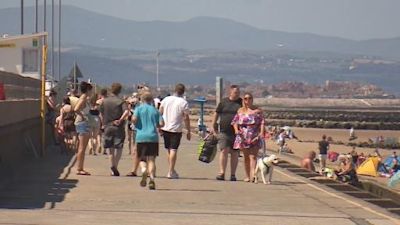What coronavirus restrictions are still in place in Wales?

Report by ITV Wales journalist Ian Lang
Coronavirus restrictions have been further eased in Wales, with up to six people allowed to meet inside homes.
Ice rinks can reopen and organised indoor events for up to 1,000 people seated and 200 standing can now take place.
Limits on the numbers of people who can meet in public places or at outdoor events will be removed and groups of up to 30 children will be able to visit residential activity centres.
Employers will also be required to provide comprehensive information on the risks and mitigations identified in their Covid-19 risk assessment to their employees.
The changes have been made as Wales moves to alert Level 1, ahead of plans to lift most coronavirus restrictions on August 7 when alert Level 0 comes into force.
Face masks will still be required in most indoor public places, except in pubs and restaurants and schools.
Vaccination certificates will also be available to people in Wales who need them, such as for foreign travel or to visit venues, but would not be compulsory.
In line with the rest of the UK, people returning from amber list countries who have received two doses of the vaccine will no longer need to self-isolate.
First Minister Mark Drakeford said he "regretted" the decision by the UK Government to remove the requirement - but as so much international travel is done through England, trying to keep the rule in Wales would be "untenable."
What are the Covid rules in Wales from 17 July?
Meeting indoors
Meeting indoors
Up to six people from different households can meet indoors in private homes and holiday accommodation.
Previously you had to form an extended household or 'bubble' in order to see people at home - and your extended household could not change.
Up to six people from different households are already able to meet in 'regulated indoor premises' - for example, cafes, restaurants, pubs and visitor attractions.
Organised indoor events
Organised indoor events
Organised indoor events can take place in Wales for up to 1,000 seated and up to 200 standing, and ice rinks can reopen.
However, nightclubs and adult entertainment venues will remain closed until at least 7 August, when it is hoped Wales will move to 'Alert Level Zero'.
Social distancing
Social distancing
Social distancing will no longer be a legal requirement outdoors. Instead, risk assessments will be carried out to ensure people's safety.
Social distancing remains a legal requirement indoors.
Face coverings
Face coverings
Face coverings will continue to be required by law in most indoor public places and on public transport, as previously announced.
Working from home
Working from home
People should continue to work from home where possible, and there is no end date for this advice at present.
A Covid-19 risk assessment must be carried out when it is "necessary" for people to return to the workplace, the First Minister said.
Travelling abroad
Travelling abroad
People who have been fully vaccinated will no longer need to self-isolate if they are returning from an amber list country, in line with the position in England and Scotland.
However, the First Minister said: "We continue to advise against all but essential travel abroad and we continue to strongly recommend to people to holiday at home this summer."
Speaking in the Senedd earlier this week, First Minister Mark Drakeford said: "Life will have returned very substantially to how it was before the coronavirus pandemic began.
"But here in Wales, we will not abandon all those measures which have done so much to keep us all safe."
Mr Drakeford said he was "reasonably confident" the vaccination programme has weakened the link between infections and serious illness.
"But there is still a risk that this third wave of the pandemic could cause real harm - either direct harm from the virus or indirect harm from, for example, people having to isolate," he said.
The country's incidence rate is currently 145 cases of Covid-19 per 100,000 people - the lowest in the UK - and it also has one of the highest vaccination rates in the world with 75% of adults having received both doses.
The latest figures show that 1,892,082 people have had both vaccines and completed the course and 2,279,139 people or 90.3% of the country have had their first dose. 170001 JUL 21